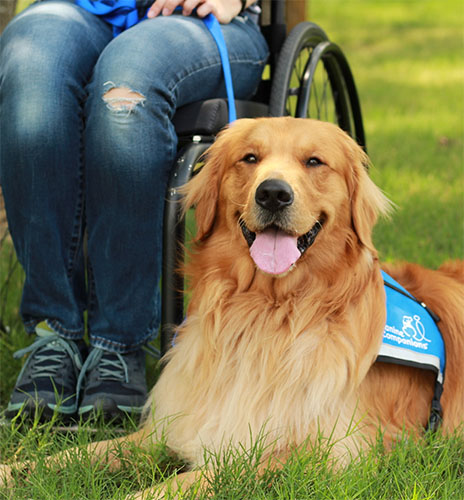Home » Tips and best practices for grassroots advocacy
Tips and best practices for grassroots advocacy
Thank you for your interest in becoming a Canine Companions Advocate!
Your voice helps amplify our position on important legislation that impacts service dog users, including Canine Companions graduates.
Please review the advocacy manual for your reference:

Canine Companions Advocacy Manual
About Canine Companions Advocacy Initiative:
Canine Companions is a non-profit organization that enhances the lives of people with disabilities by providing highly trained service dogs and ongoing support to ensure quality partnerships.
The purpose of the advocacy initiative is to protect the organization, its volunteers, and the rights of our graduates from laws or regulations that would negatively impact our community. The initiative also aims to improve access and safety for all Americans with disabilities who rely on task-trained service dogs through strengthened public and corporate policy.
Specifically, Canine Companions is committed to the following policy principles:
1. We will protect access rights in public venues for task-trained service dog users including Canine Companions graduates.
2. We will weigh in on issues that impact service dog users, including legislation and policy, when needed.
3. We will support written public access standards that meet the Americans with Disabilities Act (ADA) requirements at the federal, state, local, and business level – and to educate individuals executing those standards.
4. We will improve the public experience of service dog users, including Canine Companions graduates, through education campaigns on access.
As an advocate, you’ll receive emails with updates on important legislation, rules, and regulations impacting our community. These emails may include a call-to-action like signing a petition, emailing policymakers, tweeting representatives, and more. Advocates also have exclusive access to webinars, trainings, and meetings with government officials.
The concerns and priorities of constituents are a top priority for elected officials. That’s why influential organizations create grassroots advocacy programs that empower their communities to use their voices for change. You are contributing your voice to our community by signing-up as a Canine Companions advocate.
Advocacy do’s and don’ts:
Do –
1. Stay Informed: Canine Companions will email advocates about issues arising in Congress or your state that impact our community. Read these and take action when asked. Find your legislators online to subscribe to their newsletter and follow them on social media.
2. Be Patient: Policies often take a winding road to becoming law. But your voice is just as valuable during the second or third vote as it was during the first. When asked, please take action every time to ensure processes don’t inhibit progress.
3. Share Your Experiences: Nothing is more powerful than an illustrative example of your work and experience. We can support and oppose policies, but it’s real examples that add context to our positions. When contacting legislators, always personalize your message with examples.
4. Say Thanks: Legislators are inundated with emails, phone calls, tweets, letters and more asking them for something. It’s important to say “thank you” when our voices are heard on an issue. A simple thank you strengthens our relationships.
5. Focus on the Facts: In the current partisan environment, sometimes it’s tempting to attack a legislator personally for taking a position. Our job is to stay focused on the issue at hand and emphasize the facts or impacts of a policy.
Don’t –
1. Speak on Behalf of Canine Companions: When talking to your legislator, you’re always representing yourself, not the organization. Feel free to mention that you’re part of the Canine Companions community and share our materials, but you are always advocating your views.
2. Waste Legislators’ Time: Legislators and their staff are very busy, meeting with dozens of voters every day. Our objective is to be concise and direct. Keep your communications short and emphasize your “ask” as early as possible.
3. Discuss Other Matters: If a particular issue unrelated to our community is on your mind, save that thought for another time. We want our efforts to be focused and targeted for the greatest impact.
4. Be Afraid: You’re an expert and a voter. Feel confident discussing your experience and position. While it can be intimidating talking to legislators and their staff, this is an opportunity to educate them and establish yourself as a reliable source of information on the topic.
5. Forget to Have Fun: Advocating for policies can be serious business, but legislators are human too. Building relationships with them can include sharing funny or interesting stories or attending meetings with a buddy. In the midst of such serious work, a friendly face goes a long way.
Get Involved:
Thank you for your interest in the Canine Companions advocacy initiative. We’re excited to work together advocating for policies that improve the access and safety of our graduate teams. If you’re ready to get started, here are some ways to get involved:
1. Register: If you haven’t already, take a moment to register as an advocate. You’ll begin receiving advocacy alerts and updates from Canine Companions. This is the best way to stay informed on our efforts.
2. Follow Your Legislators: Use your address to search for your elected officials. Familiarize yourself with their positions, committee assignments, co-sponsorships, and more. Subscribe to their newsletter and follow them on social media. Get started on this website – commoncause.org/find-your-representative/.*
*Please be aware that by clicking this link, you are visiting sites that are not managed by Canine Companions. Website security, accessibility and privacy policies may be different than Canine Companions policies. Please read their policies closely.
